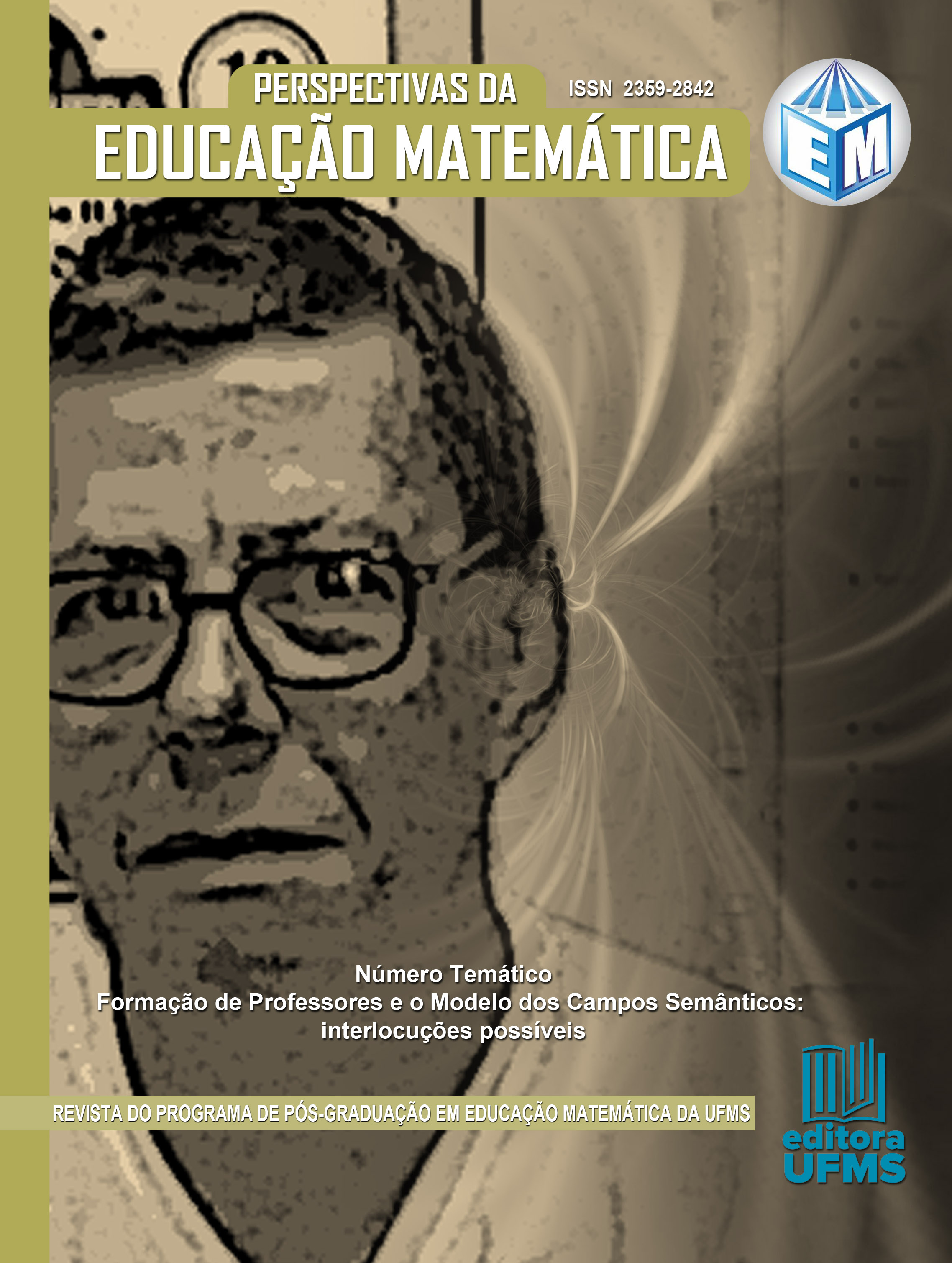The WAYS OF ORGANIZING THE TEACHING OF MATHEMATICS IN AN EARLY YEARS SCHOOL
Abstract
This article aims to characterize the ways of organizing the teaching of mathematics in a public school of early years, through a plausible reading of the speeches of one of the teachers of the partner school - from the theoretical perspective of the Semantic Fields Model. The data were produced from the several reports, in face-to-face and virtual meetings, created by the collaborative partnership, as formative or organizational meetings and school planning. We also used an instrument for data collection, in the form of a semi-structured interview. The analyses reveal the weaknesses of the initial training of general teachers and the way they deal with the difficulties faced in the exercise of teaching mathematics. The prescribed curricula, as well as the materials that accompany them, determine the way mathematics teaching will take place in the classroom. Added to this context, there are also the guidelines of the management teams and the demands of the teaching supervisors.
References
BURNYEAT, Myles Fredric. Protagoras and self-Refutation in Platoʼs Theaetetus. Cambridge - UK: Cambridge University Press, 1990.
CRUZ, Shirleide Pereira da Silva; NETO, José Batista. A polivalência no contexto da docência nos anos iniciais da escolarização básica: refletindo sobre experiências de pesquisas. Revista Brasileira de Educação, Rio de janeiro, v. 17 n. 50, p. 385-499, maio-ago. 2012. Disponível em: https://www.scielo.br/j/rbedu/a/kMzvW4fhZ8rWFZJQMFjSkpC/abstract/?lang=pt. Acesso em 29.mai.2022.
CRUZ, Shirleide Pereira da Silva; RAMOS, Nathália Barros; SILVA, Kátia Augusta Curado Pinheiro Cordeiro da. Concepções de polivalência e professor polivalente: uma análise historico‐legal. Revista HISTEDBR On-line, Campinas, v.17, n.4 [74], p.1186-1204, out./dez. 2017. Disponível em: https://periodicos.sbu.unicamp.br/ojs/index.php/histedbr/article/view/8645863. Acesso em: 29.mai.2022.
DIADEMA. Decreto nº 7871, de 27 de janeiro de 2021. Disponível em: http://www.diadema.sp.gov.br/attachments/article/25995/DECRETO%20N%C2%B07871-2021.pdf. Acesso em 02.jun.2021.
GOLDENBERG, Miriam. A arte de pesquisar: como fazer pesquisa qualitativa em Ciências Sociais. 2. ed. Rio de Janeiro: Record, 1998.
LINARDI, Patricia Rosana. Rastros da formação matemática na prática profissional do professor de matemática. 2006. 375f. Tese (Doutorado em Educação Matemática) – Universidade Estadual Paulista, Instituto de Geociências e Ciências Exatas, Rio Claro, 2006.
LINS, Romulo Campos. Epistemologia, História e Educação Matemática: tornando mais sólidas as bases de pesquisa. Revista da SBEM – SP, Campinas, v.1(1), p.75-91, set., 1993.
LINS, Romulo Campos. Por que discutir Teoria do Conhecimento é relevante para a Educação Matemática. In: BICUDO, Maria Aparecida Viggiani. (Org.). Pesquisa em Educação Matemática: Concepções e Perspectivas. Rio Claro: Editora UNESP, 1999. p. 75-94.
LINS, Romulo Campos. Characterizing the mathematics of the mathematics teacher from the point of view of meaning production. In: 10th International Congress on Mathematical Education, Copenhagen, 2006. Copenhagen. Proceedings… Plenaryand Regular Lectures, 2006, p. 1-16.
LINS, Romulo Campos. O Modelo dos Campos Semânticos: estabelecimentos e notas de teorizações. In: LAUS, Cláudia.; et al. (Orgs.). Modelo dos Campos Semânticos e Educação Matemática: 20 anos de história. São Paulo: Midiograf, 2012. p. 11-30
NACARATO, Adair Mendes; MENGALI, Brenda Leme da Silva; PASSOS, Cármen Lúcia Brancalion. A matemática nos anos iniciais do ensino fundamental: tecendo fios do ensinar e do aprender. 2.ed. Belo Horizonte: Autêntica Editora, 2017.
NACARATO, Adair Mendes; PASSOS, Cármen Lúcia Brancalion; GRANDO, Regina Célia. Organização do trabalho pedagógico para a alfabetização matemática. In: BRASIL. Secretaria de Educação Básica. Diretoria de Apoio à Gestão Educacional. Pacto nacional pela alfabetização na idade certa: Organização do Trabalho Pedagógico. Ministério da Educação, Secretaria de Educação Básica, Diretoria de Apoio à Gestão Educacional. – Brasília: MEC, SEB, 2014
São Paulo (Estado). Secretaria da Educação do Estado de São Paulo. Documento Orientador Atividades escolares não presenciais. São Paulo: abril/2020. Disponível em: http://www.educacao.sp.gov.br/coped/wp-content/uploads/2020/05/Documento-Orientador-Atividades-escolares-na%CC%83o-presenciais.pdf. Acesso em 26.out.2022.
Copyright (c) 2022 Perspectivas da Educação Matemática

This work is licensed under a Creative Commons Attribution-NonCommercial-NoDerivatives 4.0 International License.


